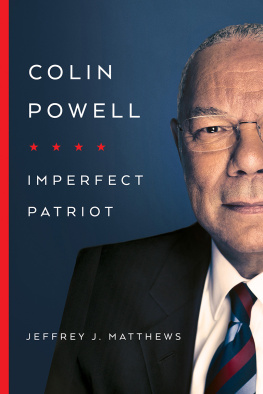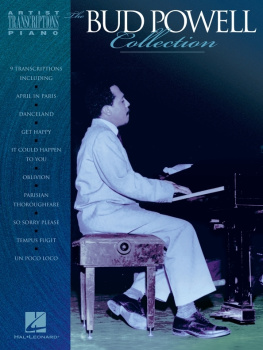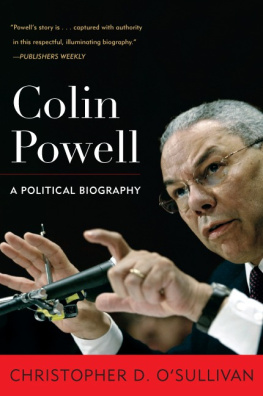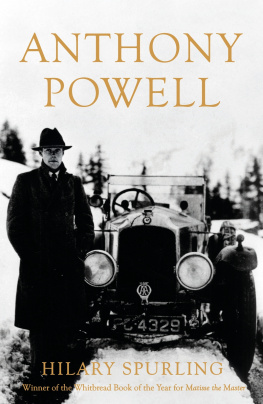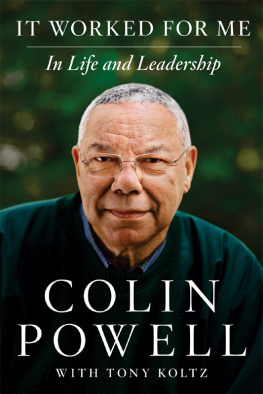Landmarks
Page-list
ACKNOWLEDGMENTS
Although the process of researching and writing is often conducted in quiet solitude, my work has depended on the generous contributions of others. Above all, military historian Harry S. Laver helped to bring this book to fruition. During its decadelong gestation, he thoroughly and effectively challenged my thinking, my evidence, and my prose. Thank you, my friend. Equally inspiring were my gentlemen mentors, historians Joseph A. Fry and George C. Herring, who continue to provide stalwart support and wise counsel. The culmination of this project is but another small return on their significant investment in me.
I want to thank Professor Howard Jones for reviewing my chapter on Powells Vietnam War experience, Malcolm Byrne for reading the Iran-Contra chapter, and the Leadership and Military History faculty of the U.S. Army Command and General Staff College for our vibrant discussion of Powells followership and his 2003 presentation to the U.N. Security Council. Thanks also to Karen DeYoung, senior national security and foreign policy correspondent of the Washington Post, for agreeing to discuss Powell with me. Her 2006 Powell biography, Soldier, is simply superb.
Many people at the University of Puget Sound have backed this project, and none more so than Professor Priti Joshi, who, for two years, acted as my primary local interlocutor on all things Powell. Thank you, Priti, for your munificence and thoughtful interrogations, which honed my arguments and fortified my confidence. I also want to thank my colleagues in the School of Business and Leadership, Provost Kris Bartanen, President Isiaah Crawford, Professors Doug Goodman, Bruce Mann, Eric Orlin, Nick Kontogeorgopoulos, and my many students, especially those who have endured the Paradigms of Leadership and Leadership in American History courses. I also must acknowledge the generous financial support of the Jewett family, whose endowment continues to underwrite my research, and the ever-generous George and Susan Matelich for providing me the opportunity to mentor our incredible group of Matelich Scholars.
Thanks to my loving familyKate, Emily, Mom, Andy, Earl, Linda, and Nadia, all my nieces and nephews, and my late father, Lieutenant Colonel Cleve E. Matthews. Thanks also to my dear friends Liz Collins and Rebecca Harrison. Clearly, angels do exist. Libby, you have captured and inspired my heart. It is indeed a long road to Yakima, but we made it. Ohio!
Finally, I must thank both Colin Powell and the staff at the University of Notre Dame Press, especially my champions Stephen Wrinn and Eli Bortz, my superb copy editor Kellie M. Hultgren, and two anonymous peer reviewers. Thanks to General Powell himself for inspiring me to write this biography, for giving me unfettered access to his papers at the NDU, and for opening up his home for an extended interview. At our meeting, I informed Powell that there would be sections of the book he would not like. To his credit, he encouraged me to write what you think is right, and I have.
BIBLIOGRAPHY
Ackerman, Spencer, and John D. Judis. The First Casualty. New Republic (June 19, 2003): 1425.
Adelman, Ken. Ground Zero: Colin Powell on War, Peace, and Balancing at the Center of Power. Washingtonian (May 1990): 71.
Adler, Bill. The Generals: The New American Heroes. New York: Avon Books, 1991.
Albright, Madeleine. Madam Secretary. New York: Harper Perennial, 2013.
Allawi, Ali A. The Occupation of Iraq: Winning the War, Losing the Peace. New Haven, CT: Yale University Press, 2007.
Allison, Sue. The General Volunteers: Still Helping Uncle Sam, Colin Powell Enlists His Countrymen to Serve One Another. Life (May 1997): 51.
Allison, Wick, and William A. Rusher. Let the Race Begin. National Review (April 4, 1994): 4650.
Annan, Kofi. Interventions: A Life in War and Peace. With Nader Mousavizadeh. New York: Penguin Books, 2012.
Armitage, Richard. Interview: Richard Armitage. Campaign against Terror. Frontline. PBS. April 19, 2002.
Aoi, Chiyuki. Legitimacy and the Use of Armed Force: Stability Missions in the PostCold War Era. London: Routledge, 2011.
Atkinson, Rick. Crusade: The Untold Story of the Persian Gulf War. New York: Houghton Mifflin, 1993.
Auster, Bruce B. Colin Powell Superstar: From the Pentagon to the White House? U.S. News & World Report (September 20, 1993): 4859.
Bacevich, Andrew J. The New American Militarism: How Americans are Seduced by War. Oxford: Oxford University Press, 2005.
Baker, James A. James A. Baker III, Oral History, White House Chief of Staff; Secretary of State, Presidential Oral Histories. Miller Center, University of Virginia. March 17, 2011. https://millercenter.org/the-presidency/presidential-oral-histories/james-baker-iii-oral-history-2011-white-house-chief.
. The Politics of Diplomacy: Revolution, War and Peace, 19891992. New York: G. P. Putnams Sons, 1995.
Baker, Peter. Days of Fire: Bush and Cheney in the White House. New York: Doubleday, 2013.
Baker, Susan D. Followership: The Theoretical Foundation of a Contemporary Construct. Journal of Leadership & Organizational Studies 14, no. 1 (August 2007): 5060.
Barber, Ben. The Colin Powell Difference: Foreign Service Veterans, the New Secretary of States Openness is a Welcome Change from Madeleine Albrights Snobbery. Salon.com. May 19, 2001. https://www.salon.com/2001/05/19/state_department/.
Barry, John. The Day We Stopped the War. Newsweek (January 19, 1992): 1625.
Battle, Joyce, and Thomas Blanton. Top Secret Polo Step: Iraq War Plan Assumed Only 5,000 U.S. Troops Still There by December 2006. National Security Archive. https://nsarchive2.gwu.edu/NSAEBB/NSAEBB214/.
Baxter, Peter. Somalia: US Intervention, 19921994. West Midlands, England: Helion & Company, 2013.
Becton, Julius W., Jr. Becton: Autobiography of a Soldier and Public Servant. Annapolis, MD: Naval Institute Press, 2008.
Beinart, Peter. The Icarus Syndrome: A History of American Hubris. New York: Harper, 2010.
Belknap, Michal R. The Vietnam War on Trial: The My Lai Massacre and the Court-Martial of Lieutenant Calley. Lawrence: University Press of Kansas, 2002.
Bilton, Michael, and Kevin Sim. Four Hours in My Lai. New York: Penguin Books, 1992.
Blix, Hans. Disarming Iraq. London: Bloomsbury, 2004.
Bolger, Daniel. Why We Lost: A Generals Inside Account of the Iraq and Afghanistan Wars. New York: First Mariner Books, 2015.
Bonin, Richard. Arrows of the Night: Ahmad Chalabi and the Selling of the Iraq War. New York: Anchor Books, 2011.
Bremer, L. Paul. My Year in Iraq: The Struggle to Build a Future of Hope. New York: Simon & Schuster, 2005.
Brenner, Marie. PlameGate. Lies and Consequences: Sixteen Words that Changed the World. Vanity Fair (October 17, 2006): 20464, https://www.vanityfair.com/news/2006/04/brenner200604.
Breslow, Jason M. Colin Powell: U.N. Speech Was a Great Intelligence Failure. Frontline. PBS. May 17, 2016. http://www.pbs.org/wgbh/frontline/article/colin-powell-u-n-speech-was-a-great-intelligence-failure/.
Brinkley, Douglas, ed. The Reagan Diaries. New York: HarperCollins, 2007.
Bumiller, Elisabeth. Condoleezza Rice: An American Life. New York: Random House, 2007.
Burns, James MacGregor. Transforming Leadership: A New Pursuit of Happiness. New York: Grove Press, 2003.
Burns, Richard Dean. The Missile Defense Systems of George W. Bush. Santa Barbara, CA: Praeger, 2010.
Bush, George H. W., and Brent Scowcroft. A World Transformed

